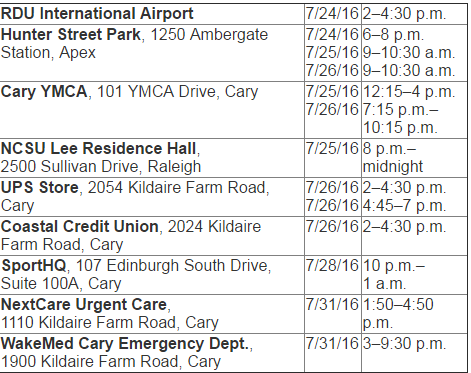The Wake County Human Services Division of Public Health has confirmed one case of measles in the county. The patient showed symptoms of the disease after returning from travel overseas.
People who received two doses of the vaccine for measles as recommended are considered protected from the virus for life. For people who have not been immunized, the disease is highly contagious.
People may have been exposed to measles at the following locations, dates and times:
Measles is spread through the air when an infected person coughs or sneezes. Symptoms begin with a fever, cough, runny nose and red, watery eyes. These symptoms are followed by a rash that typically appears first on the face, along the hairline or behind the ears, that then spreads to the rest of the body. Complications can include pneumonia, diarrhea and ear infections. Severe complications can be fatal. Infants, pregnant women and people with weakened immune systems are more at risk of complications from measles.
If you are experiencing symptoms of measles and have not been vaccinated, call your doctor right away. Your doctor can help determine if you are immune or can make special arrangements to evaluate you without putting other patients and medical staff at risk. Immunization is the best protection from measles. Two doses of the MMR (measles, mumps and rubella) vaccine are about 97 percent effective at preventing a person from contracting the disease if exposed to it. Two doses are recommended for school-aged children. They should get their first dose at 12 to 15 months of age; the second dose is usually given at four to six years of age, but may be given sooner.
People who are traveling internationally should make sure to receive adequate MMR vaccination.



